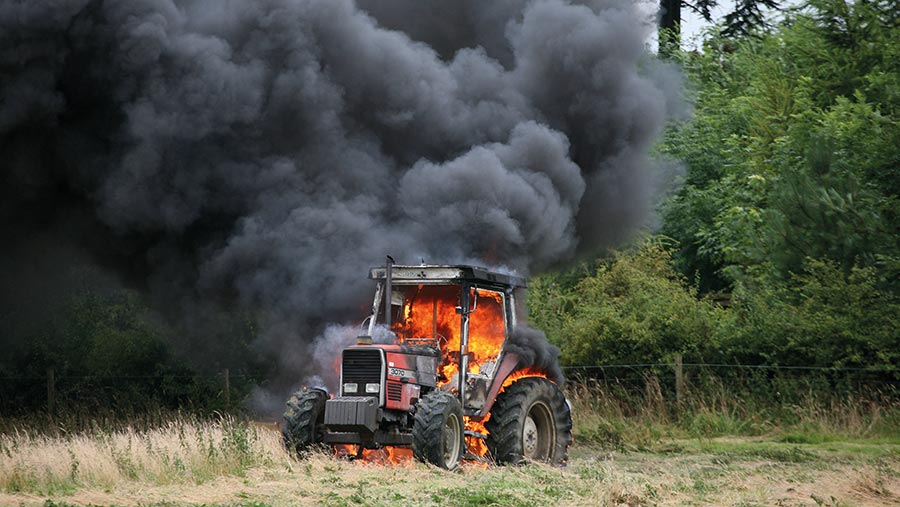Business Clinic: How can I reduce risk of harvest farm fire?
 © Tim Scrivener
© Tim Scrivener Whether you have a legal, tax, insurance, management or land issue, Farmers Weekly’s Business Clinic experts can help.
Here, Ian Berry, associate director of A-Plan Rural, advises how to best protect farms and businesses from fire damage.
See also: Business Clinic: What to consider with business interruption cover
Q. I’m selling the last of my 2021 harvest now and will be tidying up the crop storage buildings before the new harvest season starts. I have a 500ha arable farm growing a range of crops and have seen pretty frequent examples of fires affecting farms like mine over the years. I’m keen to reduce the risk of fire to my farm and business – what do you advise from both practical and insurance perspectives?
A. A typical farm faces multiple fire risks – from arson attacks (which unfortunately account for 40% of all farm fires) to flammable crops, materials catching alight, machinery faults and weather-related threats. At A-Plan Rural, 33% of our overall claims are fire-related.
It is important to think about measures to protect property, but wildfires are also a growing risk to crops as well as storage buildings, especially on arable farms.
According to the Office for National Statistics (ONS), between 2009 and 2017 fire and rescue services attended almost 260,000 wildfire incidents with around 37,00ha of land being burned.
Indeed, fires on arable land (41%) accounted for more serious wildfires than any of the other land cover types.
It goes without saying that all farms are at risk of fire, but especially arable farms in hot and dry conditions such as late summer, which is the peak time for these incidents. Straw, hay and other crops are very flammable and all it takes is a spark to ignite them.
Fires on arable farms are often in remote locations, such as barns or within the actual fields themselves, meaning it will take longer for fire crews to arrive.
As always, prevention is better than a cure, and the law requires farmers to carry out a thorough risk assessment to identify potential hazards and people at risk, then implement mitigation measures. Top tips include:
- Keep flammable materials such as fertiliser, straw and grain separate
- Store straw and hay in small stacks (insurance policies will often set a limit, for example £25,000/stack, and remove them as soon as possible to reduce the risk of arson
- Keep gates locked, use CCTV and ensure petrol and other fuels are stored securely to deter arsonists
- Create firebreaks – natural or manmade – to prevent fires spreading if they occur
- Inspect, clean and service machinery before using it – do not leave machinery unattended near flammable materials
- Ensure farm workers know what to do in the event of a fire: for example, knowing where the nearest water sources are in order to direct fire services quickly, as well as where and how to move any livestock
- Check firefighting equipment, such as extinguishers, is serviced and operational
- Clear workshops of waste, oily rags and other combustibles
- Ensure hot works, such as welding and grinding, take place away from combustibles
- Consider where farm workers should smoke/discard cigarettes
- Keep electrical inspections up to date
- Brief third parties (such as holiday guests staying on the farm) on fire safety and make them aware of risks
Unfortunately, fires occur on even the most well-assessed, best-protected farms, so it is essential to take out adequate insurance. This should cover buildings, crops and increased costs of working in the event of a fire.
Please make sure that the threat of fire to your farming business is taken seriously and be sure you know who to call if you need to make a claim.
Do you have a question for the panel?
Outline your legal, tax, finance, insurance or farm management question in no more than 350 words and Farmers Weekly will put it to a member of the panel. Please give as much information as possible.
Email your question to FW-Businessclinic@markallengroup.com using the subject line “Business Clinic”.
